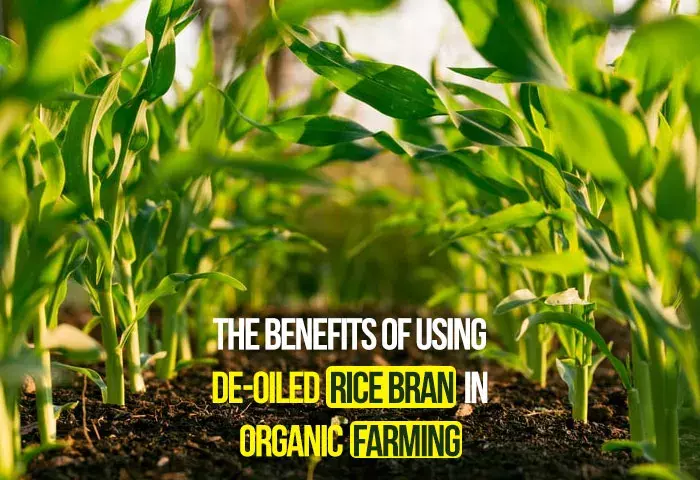In recent years, the demand for organic food has increased as people become more aware of their health and the environment. De-oiled rice bran has grown its importance in Organic farming using natural methods and products that do not contain synthetic chemicals and pesticides.
One natural product that has gained popularity in organic farming is de-oiled rice bran. They are also a by-product of the rice milling process and are obtained by removing oil from rice bran. It is also a rich source of essential nutrients such as amino acids, vitamins, minerals, and antioxidants.
The use of de-oiled rice bran in organic farming has several advantages:
- It improves soil fertility by improving soil structure and nutrient content, which improves crop yield.
- It is a natural pesticide that repels pests and insects without harming the environment.
- It helps fight plant diseases by strengthening the plant’s natural defence mechanism.
De-oiled rice bran is an environmentally friendly alternative to synthetic fertilizers and pesticides that can harm the environment and contaminate food. It is also a cost-effective solution for farmers who want to adopt sustainable and organic farming practices.
Benefits of Using De-Oiled Rice Bran in Organic Farming
Here are some benefits of using de-oiled rice bran in organic farming:
- Improves soil health:
De-oiled rice bran is rich in essential nutrients and minerals that benefit soil health. This helps to increase the fertility of the soil, which in turn promotes the growth of crops. It also improves the structure of the soil, making it more porous and allowing better water and air circulation.
- Improves plant growth:
Oil-free rice bran is rich in plant growth-promoting substances such as amino acids, vitamins, and minerals. These substances help stimulate plant growth and improve their overall health and productivity. Using de-oiled rice bran also increases root length and surface area, allowing plants to absorb more nutrients and water from the soil.
- Reduces soil erosion:
It acts as a natural mulch and helps reduce soil erosion by preventing soil particles from being carried away by wind or water. It also helps retain soil moisture and prevent soil compaction, which can promote erosion.
- Increases soil organic matter:
De-oiled rice bran is a rich source of organic matter, which is essential for soil health. Organic matter improves soil structure, water retention, and nutrient availability, which are important for plant growth.
- Acts as a natural pesticide and fertilizer:
It contains compounds that act as natural pesticides and fertilizers. These compounds help fight pests and diseases by increasing the plant’s natural defence. The nutrients contained in de-oiled rice bran act as a slow-release fertilizer that ensures a constant supply of nutrients to plants over time.
Effective Techniques of Using De-Oiled Rice Bran for Organic Farming
De-oiled rice bran is a valuable resource for organic farming. Here are some ways to use this in your farming practices:
- Mixing De-Oiled Rice Bran with Soil:
It can be mixed with soil to improve its nutrient content and texture. Add the de-oiled rice bran to the soil and mix it well. The amount of de-oiled rice bran needed depends on the soil type and the crop. Mixing 10% to 20% de-oiled rice bran by volume is a good starting point.
- Applying De-Oiled Rice Bran as a Mulch:
They can also be used as a mulch around plants to help retain moisture and suppress weeds. Spread a layer of de-oiled rice bran around the base of your plants, being careful not to cover the stems or leaves. The thickness of the layer will depend on the crop being grown, but a layer of 2 to 3 inches should suffice.
- Using De-Oiled Rice Bran in Composting:
It is an excellent addition to compost piles. It can provide a good source of carbon, which is necessary for healthy composting. Add the de-oiled rice bran to your compost pile in layers, alternating with layers of green material (such as kitchen scraps and grass clippings) and water. Aim for a ratio of roughly 3 parts brown material (like de-oiled rice bran) to 1 part green material.
- Using De-Oiled Rice Bran as a Soil Amendment:
They can also be used as a soil amendment to improve soil fertility. Spread a layer of de-oiled rice bran over the soil and work it into the top few inches with a hoe or rake. The amount of de-oiled rice bran needed will depend on the soil type and the crop grown. Generally, aim for a thickness of 1 to 2 inches.
Parting Thoughts
De-oiled rice bran is a versatile and valuable byproduct of the rice milling process that can provide numerous benefits to organic farming. It is rich in nutrients and organic matter, making it an excellent fertilizer and soil conditioner. In addition, it can also serve as a natural pest repellent and improve the soil’s water-holding capacity, leading to more efficient water use in agriculture.
As a high-quality de-oiled rice bran manufacturer, SVR Oil has demonstrated a commitment to sustainable agriculture and promoting organic farming practices. By using their products, farmers can improve their crop yields and quality and contribute to environmental conservation by reducing synthetic fertilizers and pesticides.
Furthermore, we must encourage the use of de-oiled rice bran in organic farming to achieve sustainable agriculture. This can help reduce the negative impact of conventional agriculture on the environment, such as soil degradation, water pollution, and greenhouse gas emissions. In the long run, sustainable agriculture practices can lead to healthier and more resilient ecosystems, increased biodiversity, and food security.
The benefits of de-oiled rice bran in organic farming are numerous and significant, so promoting SVR Oil as a de-oiled rice bran is important for sustainable agriculture. You should try using our products.

